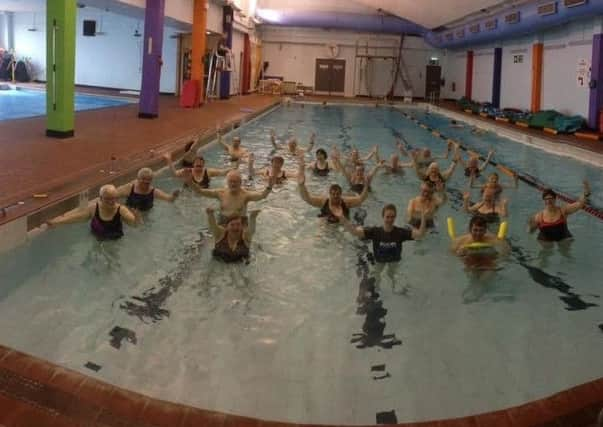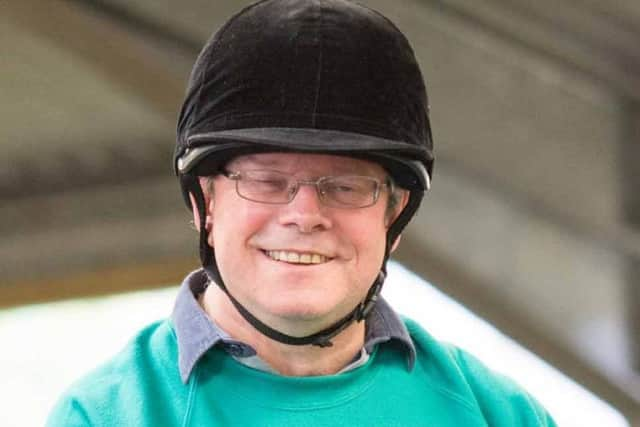Borders rehabilitation group leads to improvements


Determined to improve his health, he set up a rehabilitation group to offer exercise as well as social interaction and so the Eyemouth and District Rehab Support Group began.
The group has since gone from strength to strength with GPs, other organisations and agencies all referring new members. People can also self-refer.
Advertisement
Hide AdAdvertisement
Hide AdFrom its inception in 2013 with an initial membership of 10 – all of whom, like Jock, had Chronic Obstructive Pulmonary Disorder (COPD) – the group has expanded to include members with Parkinson’s, cerebral palsy, spinal injuries and other disabling conditions.


It now has 70 members aged from 40 upwards and there are referrals from Borders General Hospital, Eyemouth Health Centre and Chest Heart and Stroke Scotland (CHSS).
The group’s success has led to Jock being invited to give talks to various groups, GPs, physios and other health professionals, and he was recently honoured in the Thinking Differently Awards, run by Volunteers’ Centre Borders.
Borders MSP Rachael Hamilton has also persuaded NHS Borders to develop a Borders-wide rehabilitation programme in the only region in Scotland which currently does not have Pulmonary Rehabilitation services to help the 1500 people who suffer from Chronic Obstructive Pulmonary Disease (COPD).
Advertisement
Hide AdAdvertisement
Hide AdThe Eyemouth and District Rehab Support Group has grown from one to three gym classes a week and three pool sessions.
An additional class has been set up at a residential home where the residents take part in chair exercises.
“I think the key thing is the informality,” said Jock.
“There are no targets – you are just in for an hour of exercise then come out for coffee and biscuits.
“It is a social thing as much as anything. They come for the banter but we still do the exercises.
Advertisement
Hide AdAdvertisement
Hide Ad“I felt it was a bit selfish to keep it to people with COPD as there are so many folk that could use it, so we got permission from CHSS to open it up to anyone who thinks they would benefit.”
Jock (66) was first diagnosed with COPD in 2004 and on his release from hospital was given several weeks of rehabilitation therapy – then left to get on with his life.
“I was a bit shocked to find such a lack of therapy afterwards,” said Jock, a former joiner. “You work all your life then something happens and you go to hospital. You come out and get four or five weeks therapy and that’s you.”
He wanted to start something himself but was still working. However, ill health meant he had to give up work in 2011.
Advertisement
Hide AdAdvertisement
Hide AdThis was a huge adjustment and when he was invited to another rehab clinic in 2013 at his local health centre in Eyemouth he decided to try it.
He found speaking to others with the condition was so valuable he wanted to see if he could keep the group going. He spoke to CHSS who procured him a £500 start-up grant and then began discussions with the local leisure centre staff over the availability of facilities.
Eventually, the Eyemouth and District Rehab Support Group was formed, offering gentle exercise in the gym with the centre’s qualified instructor, David Dempster.
After the sessions, there was a social gathering for tea, coffee and a blether.
Advertisement
Hide AdAdvertisement
Hide AdLater, exercise sessions in the pool were introduced with the group having the additional expertise of retired lifeguard and swimming coach, Ian Learmonth, as a voluntary swimming instructor.
Jock said: “With his endless patience, Ian has coaxed many members who were afraid of the water to overcome their fear and go on to become confident swimmers.”
When the pool was closed for refurbishment, the group relocated temporarily to a space at Linkum Court, an assisted living facility in Eyemouth, where David held chair exercise sessions.
Some of the residents joined in and the sessions were so successful, they still continue today.
Advertisement
Hide AdAdvertisement
Hide Ad“There is nothing else like our group in the Borders,” said Jock. “I just wanted to help folk with problems as I had a problem myself.
“I can’t take part in the exercises as I’ve only got 30 per cent lung capacity but I do go in andhave a swim.”
It’s made a big difference in Neil’s life
Neil McMurdo is convinced that regular exercise with the Eyemouth group is helping to keep him out of a wheelchair.
The 59-year-old has cerebral palsy and arachnoiditis, a progressive spinal disease.
Advertisement
Hide AdAdvertisement
Hide AdHowever, despite his consultant predicting that he would soon be in a wheelchair it is still sitting unused in his sunroom, thanks to the pool and gym exercise, plus horse riding sessions with the Riding for the Disabled Association.
Neil, who initially wore armbands for his swim sessions, can now swim ten lengths unaided and is aiming to work up to at least 20.
“If I lose the power in my legs I can’t drive so I just keep going to the gym, pool and riding and, between the lot of them, it is keeping me active,” he said.
“The Eyemouth and District Rehab Support Group is excellent and has made a big difference to a lot of people. It boosts your confidence.
Advertisement
Hide AdAdvertisement
Hide Ad“It’s only £5 a year and £3 for each session, including the coffee and biscuits.
“The pool staff are really good – three of us use the hoist for going in and out and it is never a problem to the staff.
“A few of us have learned to swim through the lessons and Ian has been excellent. He doesn’t take any money; he just does it to help out.”
Born with cerebral palsy, Neil believes the arachnoiditis was caused by a drug he was given during a brain operation when he was eight-years-old.
Advertisement
Hide AdAdvertisement
Hide Ad“I was given something called Myodil,” said Neil. “The doctors thought the operation was the right thing at the time because my right arm would flail about and this gave me more control. Unfortunately, 45 years down the line it started causing problems.
“I managed to work for 34 years, though, and I’m married with kids so it’s just frustrating more than anything.”